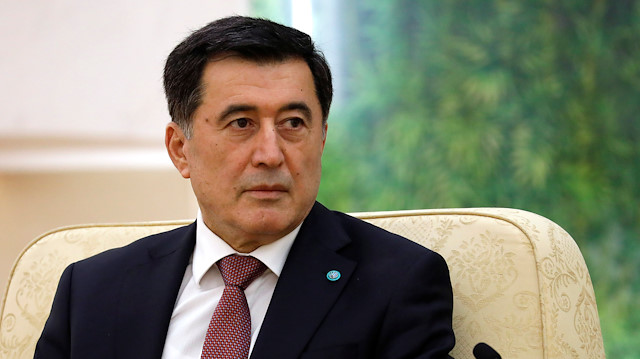
Shanghai Cooperation Organization's secretary-general expresses concern over deteriorating situation in border regions
The secretary-general of the Shanghai Cooperation Organization (SCO) on Friday said Daesh militants moved to Afghanistan from the Middle East and posed a threat to regional security.
Speaking at a webinar, Vladimir Norov said he remained concerned over the deteriorating situation in the border regions of Afghanistan.
The webinar, Afghan Peace Process and Shanghai Cooperation Organization, was organized by the think tank Islamabad Policy Research Institute.
"According to the SCO regional anti-terrorist structure, the numbers of fighters arriving in the north of the country [Afghanistan] are growing," said Norov.
These militants were moved from Syrian and Iraqi conflict zones and posed a threat to the SCO member states, he added.
The Middle East-based terrorist network recently claimed responsibility for several terrorist attacks in Afghanistan and Pakistan.
Norov also warned that Daesh terrorists use information and communication technologies in Afghanistan to promote the terrorist ideology, recruit militants, and manage the terror group's sleeper cells.
He praised Pakistan's role in the ongoing peace process in Afghanistan and said his organization supports all efforts for bringing lasting peace in the war-torn country.
SCO Director of the Executive Committee of the Regional Anti-Terrorist Structure Jumakhon Giyosov also termed the growing number of Daesh militants in Afghanistan is a big threat for the region.
"There is an increase in the number of militants arriving in northern Afghanistan, whose leaders are actively interacting with the leaders of the other terrorist organizations," Giyosov said.
He added that the transfer of experienced militants from Syria to Afghanistan has posed threats to the region including Central Asia.
Earlier this month, Pakistani Prime Minister Imran Khan and the country army also alleged that the Daesh is using the Afghan territories to operate against Pakistan with India's backing.
The terror group is flourishing in neighboring Afghanistan with "Indian backing" due to the loose control of the Kabul government, Maj. Gen. Babar Iftikhar, the Pakistani army's spokesman, told a news conference in the garrison city of Rawalpindi.
His remarks echoed a similar charge leveled by Imran Khan on Jan. 10, accusing New Delhi of backing Daesh to "inflame" sectarian violence in Pakistan.
The Middle East-based terrorist network claimed the responsibility for the killings of 11 Shia miners in the southwestern Balochistan province earlier this month.
- 'Pakistan has no favorites in Afghanistan'
Speaking on the occasion, Pakistani Foreign Minister Shah Mahmood Qureshi urged the negotiating parties of the Afghan peace process to demonstrate requisite patience, perseverance, and sense of purpose.
"It is imperative to engage constructively, negotiate with flexibility and mutual accommodation, and find common ground in pursuit of the larger objective of a peaceful and stable Afghanistan," Qureshi said.
Recalling his country's role in the peace process, he noted that Islamabad has steadfastly supported the peace process and made a positive contribution to its progress.
"We believe an inclusive, broad-based, and comprehensive settlement is particularly important," he added.
Qureshi clarified that his country wants durable peace in Afghanistan and said his message for all parties was "that Pakistan has no favorites in Afghanistan."
"We will respect the outcome of the intra-Afghan negotiations, it's up to Afghans to decide the future of their country," Qureshi said.
Deputy Speaker of the House of the Representative of the People, Afghanistan Mirwais Yasini also warned that "spoilers" are there who could thwart Afghan peace efforts.
"We have to be aware of the spoilers, the so-called Islamic State fighters, the TTP [the Pakistani Taliban's mother coalition Tehreek-e-Taliban Pakistan], other regional spoilers are there and we have to be vigilant," he said.
He urged the Doha negotiation teams to seize the opportunity and find a political settlement to end the nearly two-decade conflict in Afghanistan.
The intra-Afghan talks began after a February 2020 agreement between the Taliban and the US that sets a timeline for the withdrawal of foreign troops from Afghanistan in exchange for security guarantees.
Kabul has insisted on a permanent cease-fire, a demand so far rejected by the insurgents.
Since then, the Taliban has freed at least 1,000 Afghan security forces in return for more than 5,000 insurgents released by the government.
The two sides have been engaged in a second round of talks in Doha since Jan. 10.


